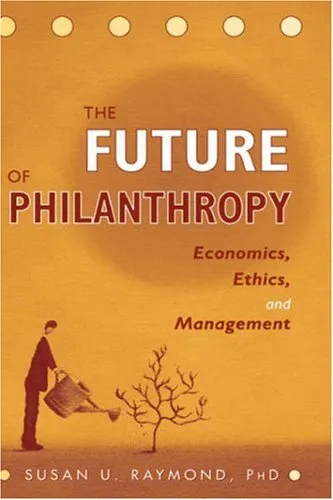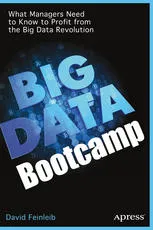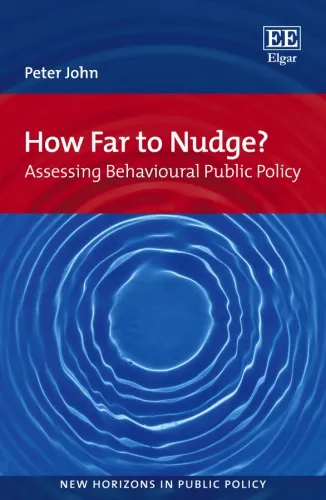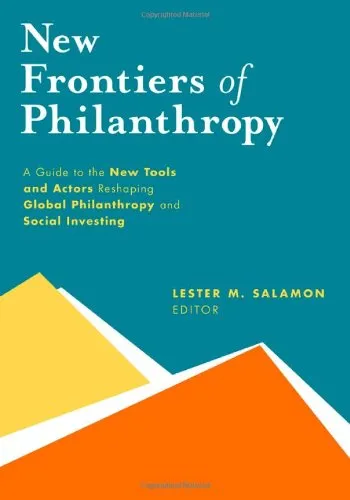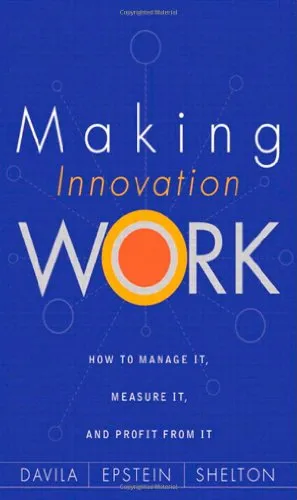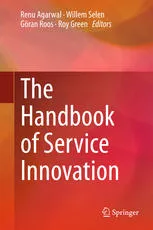The Future of Philanthropy: Economics, Ethics, and Management
4.7
بر اساس نظر کاربران

شما میتونید سوالاتتون در باره کتاب رو از هوش مصنوعیش بعد از ورود بپرسید
هر دانلود یا پرسش از هوش مصنوعی 2 امتیاز لازم دارد، برای بدست آوردن امتیاز رایگان، به صفحه ی راهنمای امتیازات سر بزنید و یک سری کار ارزشمند انجام بدینکتاب های مرتبط:
خلاصهای از کتاب
کتاب "The Future of Philanthropy: Economics, Ethics, and Management" به بررسی جامع و عمیق از آیندهی فعالیتهای خیریه در جهان امروز میپردازد. این کتاب با توجه به تغییرات سریع فناوری و اقتصاد، به تحلیل این موضوع میپردازد که چگونه سازمانهای خیریه نیاز دارند تا استراتژیهای خود را تغییر دهند و به روز کنند تا بتوانند به حداکثر اثربخشی دست یابند. نویسنده به خصوص توجه ویژهای به اقتصاد، اخلاق و مدیریت در فرآیندهای خیریه داشته و نشان میدهد که چگونه این سه عنصر میتوانند با هم ترکیب شوند تا دنیای خیریهای پایدارتر و موثرتر ایجاد شود.
نکات کلیدی
- تحلیل دقیق اثرات فناوری بر فعالیتهای خیریه و چشمانداز آینده.
- ارتباط بین اصول اخلاقی و تصمیمگیری موثر در سازمانهای خیریه.
- نقش مدیریت استراتژیک در افزایش بهرهوری و کارآیی فعالیتهای خیریه.
- ضرورت ایجاد راهبردهای نوآورانه در مواجهه با چالشهای جدید اقتصادی و اجتماعی.
جملات معروف از کتاب
"استراتژی موفق در دنیای خیریه به معنای توانایی انطباق سریع و استفاده از فرصتها برای پیشبرد اهداف اخلاقی سازمان است."
"اقتصاد و اخلاق باید به عنوان دو روی یک سکه در توسعه پایدار خیریه نگریسته شوند."
چرا این کتاب مهم است؟
این کتاب با ارائه دیدگاهها و تحلیلهای ارزشمند، برای پژوهشگران، مدیران و فعالان حوزه خیریه بسیار حیاتی است. با افزایش رقابت و تغییرات سریع در فضای اقتصادی و فناوریهای جدید، فهم دقیق تغییرات و تطبیق با آنها برای بقا و موفقیت سازمانهای خیریه ضرورت پیدا کرده است. این کتاب به طور روشن نشان میدهد چگونه میتوان از مفاهیم اقتصادی و اخلاقی برای بهینهسازی عملکرد استفاده کرد و دنیایی موثرتر و عادلانهتر را ساخت. با تغییر در نگرشها و سیاستهای خیریهای، این کتاب میتواند به عنوان راهنمایی کلیدی در طراحی آیندهای پایدار و موثر برای خیریهها باشد.
The world of philanthropy is ever-evolving, facing new challenges and opportunities that demand innovation, ethical reflection, and strategic management. "The Future of Philanthropy: Economics, Ethics, and Management" delves into the multifaceted nature of philanthropy, exploring how these elements interact and shape the future of charitable giving. This book serves as both a critical analysis and a guide for practitioners, academics, and interested readers seeking a comprehensive understanding of philanthropy in its modern context.
Detailed Summary of the Book
The book begins by setting the stage for understanding philanthropy as a crucial element of society that intersects significantly with economics, ethics, and management. It examines the historical context of philanthropic actions, tracing their roots and evolution over time. With global needs becoming more complex and urgent, the book argues for a more strategic approach to philanthropy that embraces innovation and accountability.
Shifting the focus to the economic dimension, the book explores how market dynamics influence philanthropic activities. It discusses the role of donors and stakeholders, the impact of economic downturns on giving patterns, and the potential of philanthropic ventures to stimulate economic growth and social change.
From an ethical standpoint, the book critically examines the moral considerations that underpin philanthropic decisions. It challenges readers to think about the implications of charitable actions, exploring motives, outcomes, and the responsibilities that come with wielding philanthropic power.
The management of philanthropic organizations forms a crucial part of the narrative, providing insights into effective leadership, strategy formulation, and operational sustainability. The book offers practical advice for navigating the complexities of nonprofit management, emphasizing the importance of transparency, adaptability, and impact measurement.
Key Takeaways
- Philanthropy must adapt to changing societal needs with innovative approaches and strategic foresight.
- Economic factors have a profound influence on philanthropic trends and the capacity for charitable giving.
- Ethical considerations are paramount in ensuring that philanthropy serves genuine societal needs and aligns with moral imperatives.
- Effective management and leadership are essential for maximizing the impact and sustainability of philanthropic organizations.
Famous Quotes from the Book
"Philanthropy is both an art and a science, requiring the heart's inspiration and the mind's analytical rigor."
"In a rapidly changing world, the greatest risk for philanthropy is to do nothing or to do the same as yesterday."
"Ethics in philanthropy is not merely about adherence to rules but the pursuit of true benefit for those we aim to serve."
Why This Book Matters
As the landscape of global challenges becomes more intricate, philanthropy plays an indispensable role in addressing these issues. This book is essential because it provides a structural framework for understanding and navigating the philanthropic sector's complexities. It challenges traditional approaches and encourages innovation while remaining anchored by ethical considerations. By focusing on the intersections of economics, ethics, and management, the book underscores the importance of a holistic approach for those involved in philanthropic work.
For nonprofit leaders, donors, and policymakers, "The Future of Philanthropy" offers valuable insights and practical guidance to enhance the efficacy and impact of their efforts. It is a compelling call to action for those who wish to contribute meaningfully to the betterment of society through informed, strategic, and ethical philanthropic practices.
دانلود رایگان مستقیم
شما میتونید سوالاتتون در باره کتاب رو از هوش مصنوعیش بعد از ورود بپرسید
دسترسی به کتابها از طریق پلتفرمهای قانونی و کتابخانههای عمومی نه تنها از حقوق نویسندگان و ناشران حمایت میکند، بلکه به پایداری فرهنگ کتابخوانی نیز کمک میرساند. پیش از دانلود، لحظهای به بررسی این گزینهها فکر کنید.
این کتاب رو در پلتفرم های دیگه ببینید
WorldCat به شما کمک میکنه تا کتاب ها رو در کتابخانه های سراسر دنیا پیدا کنید
امتیازها، نظرات تخصصی و صحبت ها درباره کتاب را در Goodreads ببینید
کتابهای کمیاب یا دست دوم را در AbeBooks پیدا کنید و بخرید
1308
بازدید4.7
امتیاز0
نظر98%
رضایتنظرات:
4.7
بر اساس 0 نظر کاربران
Questions & Answers
Ask questions about this book or help others by answering
No questions yet. Be the first to ask!
